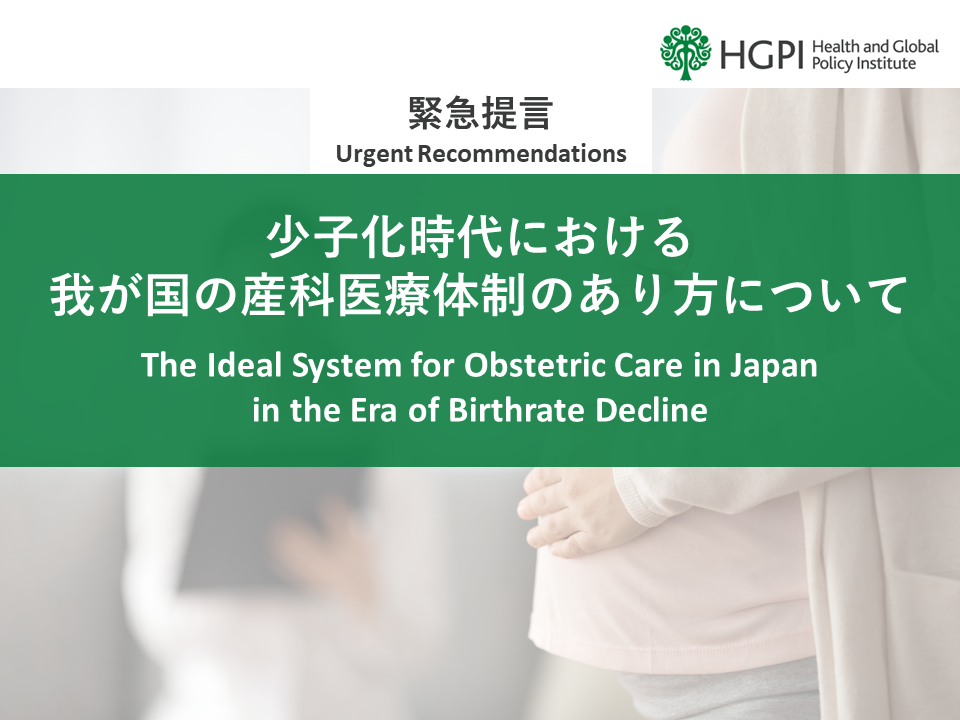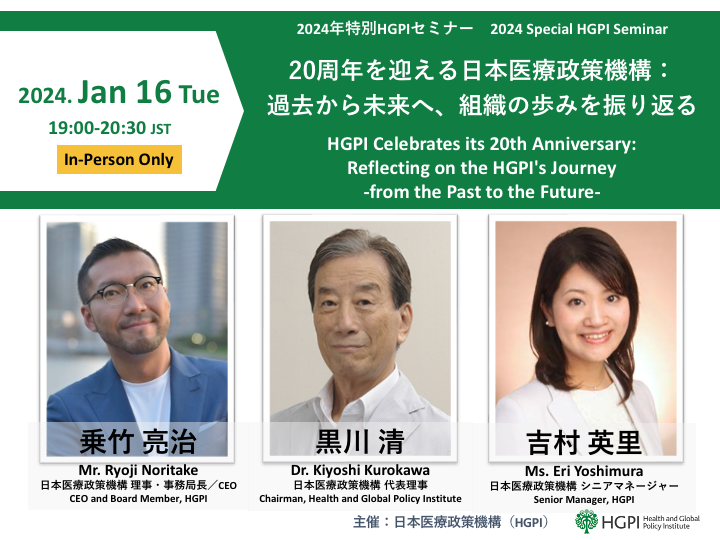[Discussion Points] Women’s Health Project Expert Meeting “The Ideal System for Perinatal Medical Care in Japan in the Era of Declining Birth Rates” (November 11, 2024)
date : 11/11/2024
Tags: Women's Health
![[Discussion Points] Women’s Health Project Expert Meeting “The Ideal System for Perinatal Medical Care in Japan in the Era of Declining Birth Rates” (November 11, 2024)](https://hgpi.org/en/wp-content/uploads/sites/2/wh-20241111-top_ENG.png)
Health and Global Policy Institute’s (HGPI) Women’s Health Project hereby announces the publication of key discussion points for to consider for future perinatal care delivery systems, based on discussions held during the expert meeting titled “The Ideal System for Perinatal Medical Care in Japan in the Era of Declining Birth Rates” on Wednesday, July 17, 2024.
At this meeting, experts gathered to discuss necessary measures in addition to current policies to maintain safe and secure perinatal care delivery systems even in an era of declining birthrates.
For details of the key discussion points, please see the PDF linked at the end of the article.
For more information about this meeting, please refer to the meeting report in the related posts.
5 Key Discussion Points
Discussion Point 1:
Various factors make it difficult to maintain Japan’s system for providing safe and secure perinatal care with the existing perinatal care system. These factors include fewer births, shortages in and aging among physicians who are responsible for delivery, especially in rural areas; the rising cost of childbirth due to rising prices for goods and higher personnel expenses, and work style reform for physicians. We must consider every possible option, including increasing the existing lump-sum childbirth and child-rearing allowance and granting insurance coverage to childbirth.Discussion Point 2:
Two goals related to financial resources for childbirth must be met: the financial burdens placed on expectant mothers and their families must be reduced; and health institutions providing perinatal care in communities must be able to operate in a sustainable manner. Achieving these two goals will require considering a broad financial support system that combines three financial resources: health insurance, public funds, and out-of-pocket payments.Discussion Point 3:
Nighttime deliveries account for about half of all deliveries. In the current system, the frequency of nighttime deliveries makes it extremely difficult to reduce the number of obstetricians on duty for deliveries while ensuring deliveries stay safe and secure. Given this unique characteristic of obstetrics, we must reconsider how to achieve the standards for overtime hours described in work style reforms for physicians.Discussion Point 4:
As the birthrate declines, one measure to be considered is the consolidation of obstetric care facilities over the medium to long term. However, consolidation places a greater burden on expectant mothers and their families the more rural the area is in which they live. As efforts to categorize health institutions by function continue to advance, careful consideration must be given to the question of how to consolidate obstetric care facilities while still maintaining the same level of care.Discussion Point 5:
Pediatricians have major roles to play before and after childbirth, such as by attending deliveries or by providing perinatal visits before deliveries. Due to birthrate decline, the sustainability of the pediatric care provision system also faces the same challenges as the system for care during the perinatal period. These challenges include the difficulty of securing financial resources and a lack of aspiring entrants to the field. We must also consider how to establish systems providing seamless care from before birth to childhood.
Top Research & Recommendations Posts
- [Policy Recommendations] The Path to a Sustainable Healthcare System: Three Key Objectives for Public Deliberation (January 22, 2026)
- [Research Report] Perceptions, Knowledge, Actions and Perspectives of Healthcare Organizations in Japan in Relation to Climate Change and Health: A Cross-Sectional Study (November 13, 2025)
- [Research Report] The 2025 Public Opinion Survey on Healthcare in Japan (March 17, 2025)
- [Policy Recommendations] Reshaping Japan’s Immunization Policy for Life Course Coverage and Vaccine Equity: Challenges and Prospects for an Era of Prevention and Health Promotion (April 25, 2025)
- [Research Report] The 2023 Public Opinion Survey on Satisfaction in Healthcare in Japan and Healthcare Applications of Generative AI (January 11, 2024)
- [Research Report] AMR Policy Update #4: Cancer Care and AMR (Part 1)
- [Policy Recommendations] Developing a National Health and Climate Strategy for Japan (June 26, 2024)
- [Public Comment Submission] “Assessment Report on Climate Change Impacts in Japan (Draft Overview)” (December 24, 2025)
- [Research Report] Survey of Japanese Physicians Regarding Climate Change and Health (December 3, 2023)
- [Research Report] The Public Opinion Survey on Child-Rearing in Modern Japan (Final Report) (March 4, 2022)
Featured Posts
-
2026-01-09
[Registration Open] (Hybrid Format) Dementia Project FY2025 Initiative Concluding Symposium “The Future of Dementia Policy Surrounding Families and Others Who Care for People with Dementia” (March 9, 2026)
![[Registration Open] (Hybrid Format) Dementia Project FY2025 Initiative Concluding Symposium “The Future of Dementia Policy Surrounding Families and Others Who Care for People with Dementia” (March 9, 2026)](https://hgpi.org/en/wp-content/uploads/sites/2/dementia-20260309-top.png)
-
2026-02-05
[Registration Open] (Webinar) The 141st HGPI Seminar “Current Status and Future Prospects of Korea’s Obesity Policy: Voices of People with Lived Experience in Policy Promotion” (March 3, 2026)
![[Registration Open] (Webinar) The 141st HGPI Seminar “Current Status and Future Prospects of Korea’s Obesity Policy: Voices of People with Lived Experience in Policy Promotion” (March 3, 2026)](https://hgpi.org/en/wp-content/uploads/sites/2/hs141-top-1.png)
-
2026-02-06
[Research Report] AMR Policy Update #5: Cancer Care and AMR (Part 2)
![[Research Report] AMR Policy Update #5: Cancer Care and AMR (Part 2)](https://hgpi.org/en/wp-content/uploads/sites/2/HGPI_20260204_AMR-Policy-Update-5.png)







